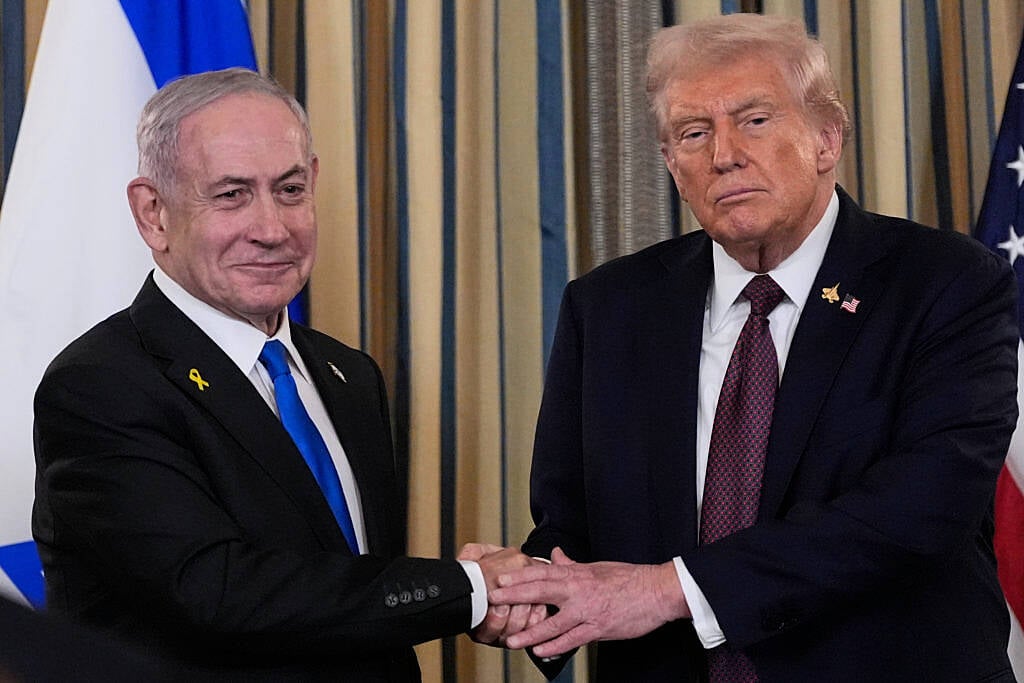**Trump and Netanyahu Agree on Gaza War-End Plan, Uncertainty Remains Over Hamas Acceptance**
US President Donald Trump and Israeli Prime Minister Benjamin Netanyahu have announced an agreement on a plan to end the war in Gaza. However, it remains uncertain whether Hamas will accept the proposed terms.
On Monday, President Trump unveiled a comprehensive 20-point plan aimed at ending the Israel-Hamas conflict and establishing post-war governance in the heavily affected Palestinian territory. Central to Trump’s plan is the formation of a temporary governing board for Gaza, which would be headed by Trump himself and include former British Prime Minister Tony Blair.
Importantly, the plan does not require the evacuation of Gaza’s residents and calls for an immediate ceasefire, contingent on acceptance by both parties. It also stipulates the release of all remaining hostages within 72 hours of Israel’s acceptance.
Speaking at a joint news conference with Netanyahu, President Trump expressed optimism about reaching a deal. “I think we are beyond very close… We’re not quite finished. We have to get Hamas,” Trump said.
Prime Minister Netanyahu emphasized Israel’s readiness to act decisively should Hamas refuse the peace proposal. “If Hamas rejects your plan, Mr President, or if they supposedly accept it and then do everything to counter it, then Israel will finish the job by itself,” he stated. “This can be done the easy way or it can be done the hard way, but it will be done.”
Trump also urged the Palestinian people to take responsibility for their future by embracing the peace plan.
**Diplomatic Efforts Underway, Hamas Response Pending**
Qatar’s Prime Minister and Egypt’s intelligence chief presented Trump’s proposal to Hamas negotiators, who are reportedly reviewing it in good faith, according to a source familiar with the matter. The source, speaking on background, was not authorized to comment publicly.
While Hamas has previously indicated willingness to step back from governing Gaza, the militant group has consistently refused to disarm — a key demand from Netanyahu for any long-term truce.
**Netanyahu’s Apology to Qatar Over Military Strike**
Amid these developments, Netanyahu extended a formal apology to Qatar’s Prime Minister Sheikh Mohammed bin Abdulrahman Al Thani for a recent Israeli missile strike targeting Hamas officials in Qatar. The strike, which angered Arab leaders and elicited rare US criticism of Israel, had risked derailing peace talks.
The call between Netanyahu and Sheikh Mohammed was described by the White House as a “heart-to-heart” exchange. In a statement, the White House said Netanyahu expressed “deep regret” over the strike, which unintentionally killed a Qatari serviceman, and acknowledged the violation of Qatari sovereignty during hostage negotiations. Netanyahu also assured that Israel will not conduct similar attacks in the future.
Despite the apology, Israel’s far-right National Security Minister Itamar Ben-Gvir defended the strike on social media as “an important, just and ethical attack.”
**Tenuous Moment for Israel and the White House**
The diplomatic talks and Netanyahu’s apology come at a fragile time for Israel. Internationally, Israel faces increasing isolation and declining support from countries that had long been staunch allies. Domestically, Netanyahu’s governing coalition appears increasingly unstable. The White House leadership is also showing signs of impatience with the conflict’s continuation.
President Trump, who has shown steadfast support for Netanyahu throughout the war, indicated confidence that a deal could be reached soon. When asked by reporters about a ceasefire, he said, “I am. I’m very confident.”
**Background on the Qatar Strike**
Israel’s missile strike on September 9 targeted the headquarters of Hamas’s political leadership in Qatar as the group’s top figures gathered to consider the US ceasefire proposal. No senior Hamas officials were killed.
The attack represented a significant escalation, targeting the territory of a US ally that hosts thousands of American troops and has acted as a key mediator throughout the conflict. Trump described the strike as “out of step” with US and Israeli interests and moved swiftly to reassure Qatari allies.
Qatar condemned the strike as a blatant violation of international law. Other Gulf allies of the US, including Saudi Arabia and the United Arab Emirates, voiced support for Qatar’s position.
The White House noted Sheikh Mohammed’s acceptance of Netanyahu’s assurances and Qatar’s ongoing readiness to contribute to regional security and stability.
**White House Calls for Ceasefire and Hostage Release**
Earlier on Monday, White House Press Secretary Karoline Leavitt urged both sides to finalize a ceasefire agreement and secure the release of hostages. “Ultimately, the president knows when you get to a good deal, both sides are going to leave a little bit unhappy… But we need this conflict to end,” Leavitt said.
Trump and Netanyahu began Monday with working sessions in the Oval Office and a private lunch, with a joint press conference scheduled later.
Meanwhile, Riyad Mansour, Palestinian Ambassador to the United Nations, stated that Palestinian officials are ready to work with Trump and Arab countries to bring the conflict to an end. “Let us not delay a single minute more in doing what is necessary for this just peace to replace the unbearable reality of today,” Mansour said during a UN Security Council meeting.
**Trump’s Shifting Stance and Frustration**
President Trump and Netanyahu have maintained close ties, with Trump supporting Israel’s brief strike on Iranian nuclear sites in June and defending Netanyahu during his corruption trial, which Trump described as a “witch hunt.”
However, relations have become strained recently. Trump expressed frustration over Israel’s failed strike in Qatar and last week vowed to prevent Israel from annexing the West Bank — a contentious issue opposed by the international community, which fears it would end hopes for a two-state solution.
Ahead of Monday’s meeting with Netanyahu, Trump raised public expectations by stating the US was “very close” to a deal on Gaza.
—
*This developing story highlights the complex diplomatic efforts underway to end the Gaza conflict, with careful attention to regional sensitivities and the challenges posed by Hamas’s stance.*
https://www.breakingnews.ie/world/trump-and-netanyahu-say-they-have-agreed-to-a-plan-to-end-gaza-war-1812667.html


